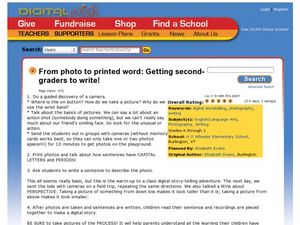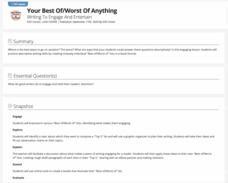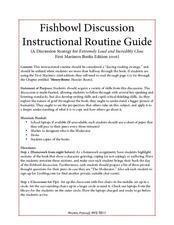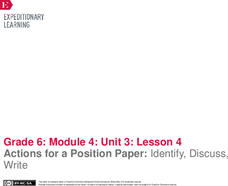Curated OER
Further Improvements of Writing Skills
Improve writing skills by finding a personal writing style, using descriptive language effectively, and using precise language. Middle schoolers discuss individual style in writing and formal and informal language. They utilize figures...
Curated OER
The "Write" Stuff: Strategies and Conventions for Imaginative Writing
Fifth graders develop and practice the steps involved in imaginative writing. They follow the steps/worksheets included and write imaginative stories of their own.
Curated OER
Phineas Gage: Four Corners Discussion Strategy
How far do your pupils think we should go in the name of science? Class members respond to questions relating to chapter three of Phineas Gage: A Gruesome but True Story About Brain Science and then participate in a four corners...
Curated OER
The Lightning Thief: During Reading Strategy
After reading up to page 371 of Percy Jackson and The Olympians: The Lightning Thief by Rick Riordan, get insight into how Percy felt making a major decision through active discussion strategies that enable both academic...
Curated OER
From Photo to Printed Word: Getting Second-Graders to Write
Use photographs to entice your children to write! In this digital storytelling lesson, students study the functions of digital cameras. They review their sentence-writing skills, then take digital photos and write sentences that describe...
Novelinks
Touching Spirit Bear: Question Answer Response Strategy
What types of questions help readers learn the most? Sixth, seventh, and eighth graders learn how to ask four types of questions from the Question Answer Response (QAR) reading strategy to help grow their comprehension of Touching Spirit...
Curated OER
Marriage and Financial Goals, Budgeting Strategies
There is no more useful life skill to learn than budgeting and setting financial goals. It's math that is used by every person, everyday. Learners examine the responsibilities and costs involved in family economics. Through a series of...
Forum
A Research Toolkit of 12 Reading Strategies for the Foreign Language Classroom
Learning to read is not a simple task, but there are methods for assisting pupils as they develop literacy skills. The first four pages of this resource include information about language development and reading development, as well as...
Curated OER
Writing Short Stories: The Fun Way
Do your young authors suffer from writer's block when they try to write short stories? Access their natural creativity with C-Gor, the writing monster! The instructional activity takes aspiring authors through a new writing process...
K20 LEARN
Your Best Of/Worst Of Anything: Writing To Engage And Entertain
It was the best of places! It was the worst of places! Middle schoolers practice their descriptive writing skills by creating an e-book about the best of/worst of topics. A series of activities about descriptive writing and worksheets...
Facing History and Ourselves
Fishbowl Discussion
Filter young teenagers' opinions and perspectives with a classic fishbowl discussion. Given any topic relevant to your curriculum, a group of class members engage in discussion for their peers to observe.
Brigham Young University
Rosencrantz and Guildenstern Are Dead: Fishbowl Discussion
After reading through Act II of Rosencrantz and Guildenstern Are Dead, take some time to discuss the references to death in the play. For this fishbowl discussion, learners prepare questions, practice answering individually and with...
Curated OER
Make a Social Skills Superhero Comic Book
Get creative as you teach a lesson plan on positive peer and social interactions. Discuss good social interactions through a scenario, brainstorm a positive response to the scenario, then creat a comic book superhero that exemplifies the...
Missouri Department of Elementary
The Hope to Cope: Coping Skills
Making decisions can be stressful, even for sixth graders. And even students this young have developed coping skills, some positive and some negative, to help them deal with stress. Class members are asked to identify several of their...
EngageNY
Revising Draft Letters to a Publisher about an Athlete’s Legacy: Critique and Feedback, Part I
Pick a corner, any corner! Pupils use the Four Corners strategy and Peer Critique protocol to assess one another's draft letters to a publisher about an athlete's legacy. Scholars then use peer feedback to revise their letters.
Curated OER
Extremely Loud and Incredibly Close: Fishbowl Discussion Instructional Routine Guide
What exactly does make life worth living? In preparation for a fishbowl discussion of Extremely Loud & Incredibly Close, readers of Jonathan Safran Foer’s novel highlight sections that show a character grieving, coping, or suffering...
Bright Hub Education
Writing Effective Dialogue
Wait, there is an effective way to practice writing dialogue with your high school class? Great! High schoolers will have a blast writing dialogue using a list of potentially silly situations and an image of people talking. Employ the...
EngageNY
Actions for a Position Paper: Identify, Discuss, Write
Anchors aweigh, it's time to write! After viewing an anchor chart detailing the parts of a position paper, pupils share their plans for their essays with a partner. Next, they write the rough draft of their body paragraphs.
Curated OER
Writing a Business Letter to Compare and Contrast
Students compose business letters. In this writing skills lesson, students use the business letter format as they note cause and effect relationships between the weight epidemic in the United States and changing menus in American...
EngageNY
Writing: Drafting Body Paragraphs and Revising for Language
Begin the drafting phase of the writing process with a lesson plan focused on logically writing three body paragraphs. Then, revise the writing to make it more formal after a teacher-directed mini-lesson plan. Each paragraph highlights...
EngageNY
Planning for Writing: Introduction and Conclusion of a Literary Argument Essay
After completing three body paragraphs of an argument essay about life's rules to live by from Bud, Not Buddy Christopher Paul Curtis, it's time to begin writing the introduction and conclusion. Independently, pupils draft the final two...
ReadWriteThink
Captioning the Civil Rights Movement: Reading the Images, Writing the Words
Scholars boost their knowledge of the Civil Rights Movement with a lesson that challenges writers, readers, and historians to analyze primary sources and caption their observations. By way of reading, writing, discussion, independently,...
Curated OER
Writing Process-- Revision and Editing
As guided practice, class members work together to revise a model persuasive paragraph. Then they practice independently with their own writing. The included rubric looks at prewriting, drafting, revising, editing, nonfiction text...
EngageNY
End of Unit 2 Assessment: Working with Two Texts - Reading, Listening, Summarizing, and Synthesizing
As a summative assessment for this unit on colonial trade, fourth graders listen to and read informational texts in order to demonstrate their ability to take notes, write summaries, and draw connections. Young scholars first listen as...























